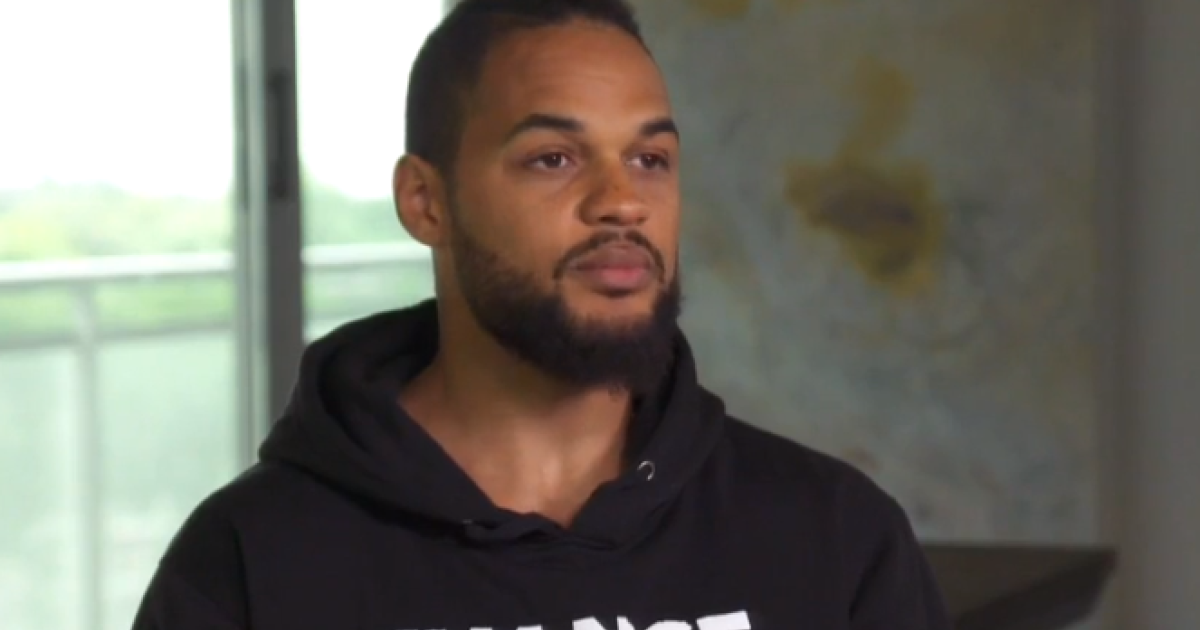Players for the Texas Rangers and Colorado Rockies took a knee at their season opener Friday night to show solidarity with the Black Lives Matter movement. The ongoing demonstrations come almost four years after Colin Kaepernick began that form of protest against police brutality and racial injustice.
The former San Francisco 49ers quarterback – and the recently energized social justice movement – have inspired a new push for equality in the world of sports, CBS News correspondent Errol Barnett reports.
When professional ice hockey player Akim Aliu hits the ice, he focuses on scoring and prepares for contact. But when he was one of the few Black players in the NHL, he shouldered other blows.
“I was the only Black kid in the room when the coach called me the n-word,” Aliu said. “Obviously it’s a sensitive subject for me to talk about, but I just felt that if I said anything about it, then I would have no career.”
Akim Aliu
CBS News
Last year, Aliu decided he would risk everything and speak publicly about his experiences with racism in hockey. He wrote an op-ed titled “Hockey is Not for Everyone” for The Players Tribune, detailing the many indignities he experienced, like another player knocking his teeth out when he refused to be hazed.
An avalanche of supportive statements from coaches, players and fans rolled in after the op-ed was published. But Aliu wants change.
“We want to create an atmosphere where kids can talk about some of these issues,” he said. “And sooner or later try to eradicate some of these issues so that they don’t exist.”
Aliu is trying to address racism directly to make hockey more welcoming, inspired by his friend, Colin Kaepernick. He established the Hockey Diversity Alliance with several other players of color to put pressure on the NHL.
“I think if a Black kid in Compton, California, sees Akim Aliu or Trevor Daley, or all the other guys, have tattoos, have afros, they could be like, ‘Oh, maybe I could play this game.'”
The power of seeing your own image on ice, or on the field, is embodied in Christian Adams, who grew up in Washington, D.C., and was drawn to rugby. The sport was an option for Adams because the nation’s first all-Black rugby high school team was nearby.
But, like Aliu, he has felt like an outcast.
“There was a lot of Black players on our team. So they called us criminals,” Adams said. “I’ve been called racial slurs before. The people who called us criminals were fans in the stands.”
Christian Adams.
CBS News
Despite that, Adams fell so hard for the sport he’s played all the way through college, and is now with the New England Free Jacks — a standout in Major League Rugby.
“Certain sports are marketed to inner-city youth more than other sports,” he said. “That’s why you see more Black basketball players and footballers than you do … Black lacrosse players.”
“There isn’t really an opportunity for those kids to engage into those sports,” he said.
Lucia Deng is the president of Century Road Club Association, one of the oldest and largest cycling clubs in the country. She said her sport doesn’t showcase women or minorities equally, and in order to bring about change, leaders have to openly push for it.
Lucia Deng
CBS News
“If you look at any other professional sport, the more diversity it has, the better opportunity Americans have to elevate the sport,” she said. “So why not cast the net wider?”
USA Cycling added more women’s-only professional races, and recently announced efforts to combat institutional racism.
“We need to understand that the battle is not amongst each other. The battle is for equality for all of us,” said USA Road National champion Justin Williams.
Justin Williams
CBS News
While Williams is pointed to as an example of the success of inclusivity, Deng said the climb is much steeper.
“When you see the bike industry put out commercials and Instagram posts and it’s all white faces, maybe you feel like … they’re not really trying to get me to be involved,” Deng said, adding that “the whole industry” needs to think about how they’re doing things.
“When you walk around the city, you see a lot of Black and Brown kids on bikes. They’re just on different kinds of bikes,” she said.
Soul searching is happening across all professional athletics, from soccer to NASCAR.
Last month a noose was discovered in the garage stall of Bubba Wallace, NASCAR’s only Black full-time driver. After the incident, fellow drivers and crewmembers helped push Wallace’s car during pre-race activities as a sign of support.
Aliu said that kind of backup is the point.
“I mean the solidarity that was shown when they were pushing his car was … amazing to watch, I mean it touched me,” Aliu said.
“The racism issue, I think it’s a conversation people are going to be having and learning about 100 years from now. So I think we all want to be on the right side of history and to create change.”
